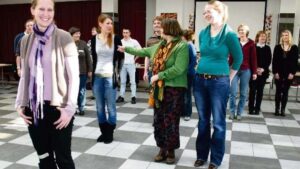TeachingBase
Take a Step Forward
We are all equal, but some are more equal than others. In this activity, participants take on roles and move forward depending on their experiences and opportunities in life. This method raises awareness about inequality of opportunity, develops imagination and critical thinking and fosters empathy with others who are less fortunate.
Duration |
approx. 30min |
Material
Location
|
Complexity |
middle | |
Social form |
Group |
- Teaching material type Experiment, Game, Project
- Subject Areas Ethics, Interdisciplinary, Politics, Social Studies
- Suitable Grade Levels 6-8, 9-12, Expert, Graduate, Teacher education, Undergraduate
- Content Anchors Cooperation Games, Games
- CSL Phases Reflection
Source
method
https://iz.or.at/toolbox/take-a-step-forward/
https://www.coe.int/en/web/compass/take-a-step-forward
variations
https://star-e.icja.de/engaging-young-people/training-methods/take-a-step-forward/
picture
https://www.kreiszeitung.de/lokales/verden/schule-macht-schritt-nach-vorn-1139059.html
Authorship notes
Eva Johanna Weißig
- Attribution-NonCommercial-ShareAlike [CC BY-NC-SA]


